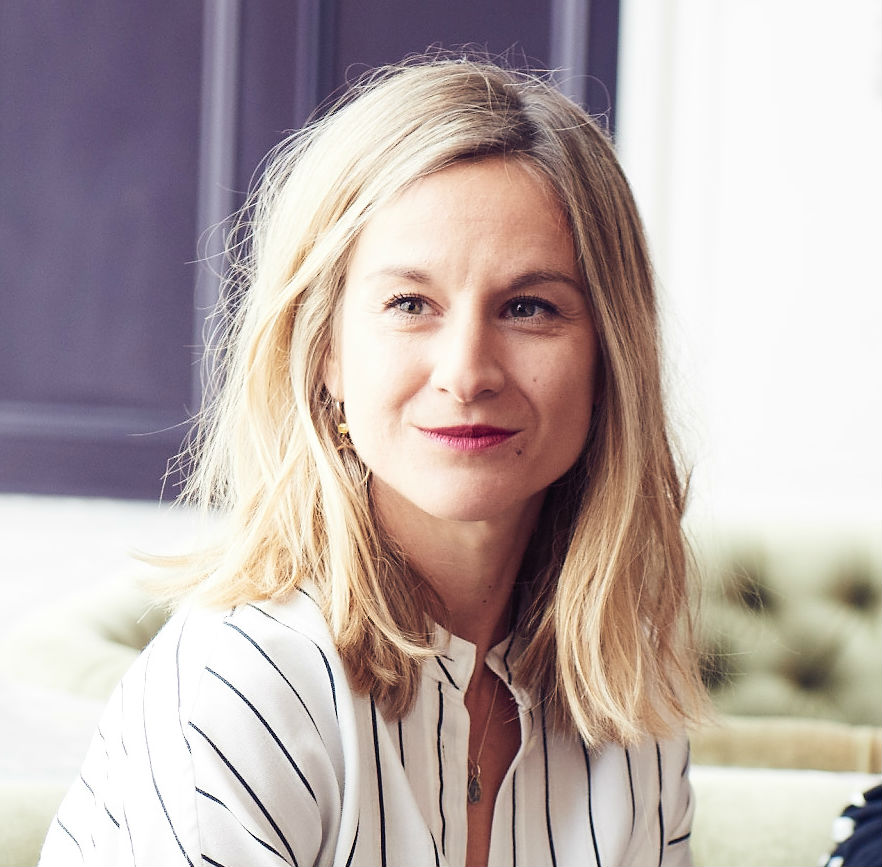Can swearing help you beat stress? F**k yeah
Warning: this feature contains a high level of profanity. Tracy Ramsden meets the therapists teaching expression through expletives


Celebrity news, beauty, fashion advice, and fascinating features, delivered straight to your inbox!
You are now subscribed
Your newsletter sign-up was successful
Warning: this feature contains a high level of profanity. Tracy Ramsden meets the therapists teaching expression through expletives
It’s 10.30 on a Saturday morning and I am in a London hotel room, shuffling awkwardly from foot to foot while doing half-hearted jazz hands. To my right, a woman – late twenties, leather jeans – kicks out her Converse, arms windmilling like a child at Disneyland. On my left, a thirtysomething man in jeans hops around barefoot, playing air maracas in the manner of Bez. There is no music. Yet 35 people are dancing their hearts out, heads back, eyes closed in abandonment. Welcome to F**k It school, where nobody gives a shit.
The brainchild of John Parkin and his wife Gaia Pollini, two former London ad execs turned maverick healers, the F**k It philosophy is the art of giving less of a damn. Caring too much about what other people think is a predominantly female malaise. In his book The Stressed Sex, psychologist Daniel Freeman analysed the best evidence available: 12 large-scale, national epidemiological surveys from the UK, the US, Europe, Australia and New Zealand, South Africa and Chile. A remarkably consistent picture emerged: in any given year, women appear to experience higher rates of stress disorders than men. In fact, the difference is typically 40 per cent. According to a similar study by the University of the Basque Country, women simply feel guiltier than men. It was Erica Jong who said, ‘Show me a woman who doesn’t feel guilty and I will show you a man.’
This could go some way to explaining the spike in thirtysomething professional women booking into F**k It retreats. (The asterisks, incidentally, are purely there so the website gets through your work’s computer firewall.) They now turn away up to ten people per session, and John and Gaia have recently launched their first women-only retreat. Today, in London, the backdrop is a far cry from the sun-drenched Italian hills where the couple live and have quietly been preaching the art of profanity since 2008.
‘But it’s easy to relax in paradise, right?’ John says. ‘In London, we’re helping people to switch off when they’re moving at 100mph in a world of constant distraction.’ Sirens wailing from the street below emphasise his point. According to Gaia, one’s early thirties are prime F**k It territory. ‘We are told, look at all these opportunities, now go get them!’ she says. ‘But nobody is there to teach us how to edit our options, so we end up guided by external messages from friends, parents, bosses, mass media, Twitter and Facebook rather than by what we feel inside. Our retreats are about saying “fuck it” to all the incessant chatter out there.’
It’s something that Kate, 34, can identify with, she tells me when we are paired up for an exercise. She runs her own social-media marketing agency and discovered the F**k It philosophy in 2011. ‘I was going through a rough patch with my business, wondering whether to jack it all in,’ she explains. ‘At the same time, all my mates were settling down and having babies, and I kept reading headlines about ticking biological clocks. It left me panicked. Somehow, the stakes feel higher when you hit 30. F**k It helped me to tune it all out and work out what I wanted, not what I thought I ought to be doing.’
In her book, Eyes Wide Open: How to Make Smart Decisions in a Confusing World, Noreena Hertz claims that we have to make up to 10,000 trivial decisions every day – 227 of which are just about what we eat and drink. And although the consequences of a skinny latte versus a flat white are minimal, throw in a biggie about your health, job or relationships and you’re looking at some serious low-level but constant anxiety.
Celebrity news, beauty, fashion advice, and fascinating features, delivered straight to your inbox!
http://giphy.com/gifs/8mLnkS2xcqtdm
Much of the appeal of this new way of living lies in F**k It’s
irreverent approach. It is self-help for the time-poor and psychobabble
intolerant, like me. My F**k It year began in March 2013, when I quit
the security of a PAYE salary in a job I loved – as an editor on a
national magazine – to reassess where I wanted to go next. I had spent
my twenties chasing the dream but, thanks to bad timing (and a hefty
recession), when I got there it wasn’t the promised land I had
envisioned. As in most industries, I saw friends crushed by redundancy,
while those who remained soldiered on through 16-hour days. I should add
for context that my beloved nan had just lost her battle with a stroke
and among all the other complexities of grief, I had simply started to
wonder what life was all about. Death can do that.
Fast-forward
to now and I’m relieved that Nan isn’t around to watch me standing in a
room full of strangers chanting ‘fuuuuuuuuuck iiiiiiiiiiit’. If I had
expected a type (and admittedly, I had: braids, gap-year beads, tie-dye
muslin trousers), this is off-brand: women wear skinny jeans and tops
from COS. As if we’re in a meditative yoga class, we are told to inhale
in unison. With the exhalation we must say the words ‘fuck it’ slowly.
Aside from expression through expletives, we are encouraged to use
visualisation to return to our ‘alpha state’, stripping back the layers
of influence we acquire throughout adulthood and returning to
uninhibited childhood bliss. I’m taken aback by how simple yet effective
it is at immediately stopping the chatter in my head and helping me to
focus.
At its core, F**k It philosophy aims to teach us how to
tune out external messages and listen instead to our inner, truer self.
Right now, we are undergoing something of an obsessive comparison
epidemic, and social networking is its biggest enabler. Helene, 41,
confesses to Facebook-stalking her friends and feeling like a terrible
mother in comparison. Lisa, 28, an outwardly confident-looking blonde,
is surprisingly softly spoken when it’s her time to speak. She admits to
being so secretly obsessed with what everyone else is doing on Facebook
that it keeps her awake at night: ‘I scroll through in bed before I
switch off the light, then lie there for hours, wondering why I’m not as
successful, or thin, or happy as all my friends.’
Is it any wonder that Lisa and millions like her feel this way? Crowdsourcing for validation has become de rigueur; we get our endorphin hits from a Facebook ‘like’. The author of Generation Me, Jean Twenge, says positive comparison can, to an extent, be a good thing. ‘What would the world be like if no one cared what other people thought?’ she asks. ‘If we never listened to feedback we’d have no idea what our talents are or what to improve. But when we listen to others over ourselves, or it becomes about perfectionism, that’s not good.’ After all, will the crowd always have our best interests at heart?
In the foyer, I meet Natalie from West Sussex, whose life went drastically off course when she was 30. ‘Throughout my twenties I had an image of my future self,’ she says: ‘The job, the flat, the wardrobe – and I single-mindedly pursued it.’ By 30 she was living the proverbial dream, as HR director of a multinational media corporation. But somewhere along the way she had ignored the lost evenings spent juggling international time zones, and the crippling insomnia. ‘One day, I just broke down at my desk,’ she says. ‘I burst into tears, hyperventilating, and I couldn’t stop. I don’t remember the journey from my office to the GP’s surgery, but I remember telling the doctor I was deeply concerned about myself. He told me my endocrine system was on its knees. In short, I was having a full-blown mental, physical and emotional breakdown.’
‘When was the last time you did nothing but just sit there and be?’ John asks us. I think of all the bus journeys punctuated with scrolls of Twitter, and the nights in hijacked by DVD box sets. ‘It was probably when you were asleep,’ he answers for us. Given that a third of people suffer insomnia, it could be longer ago than that. Relaxing has become that niggling job we know we should do, but we’ll do anything to avoid.

Later that afternoon, bleary-eyed, I wake up lying on the musty carpet, after what can only be described as a communal nap. The most satisfying I’ve had in weeks, I should add, thanks to some simple but effective conscious breathing (into your belly, not your chest). The theory goes like this: the in breath is your yang – energetic, enthusiastic. Cue: communal inhale and chants around the room of things like, ‘Fuck it, I’m going for that promotion.’ But it’s as much about letting go as it is pushing ahead. Your out breath is yin – relaxing, soft, relinquishing the things that bother you. I hear exhalations of, ‘Fuck it to what people think of how I look.’
When we catch up as the weekend draws to a close, Natalie bounds up, infectiously positive, and reflective. ‘It sounds overly simplistic, but just by saying fuck it, you stop fretting about the small stuff,’ she says. ‘It’s about not attaching too much to an end goal and just enjoying the ride. Letting yourself off the hook to change direction is really empowering.’ It makes me think about the friend who recently went on maternity leave and confessed, ‘It’s the only way to have a break from work. A grown-up gap year would be frowned upon in my industry without a valid excuse like a baby or a new job.’
But there’s a shift occurring and I’ve noticed it among friends. Lucy, a freelance fashion photographer based in New York, is moving back to London for a job in sales. ‘I lost that dreamy “I can have it all” attitude and realised I’d be happier in a job that pays more, freeing me up to do things that fulfil me outside of work, like learn ballet,’ she explains. Meanwhile, Miranda quit her high-profile job as an editor and retrained as a yoga instructor. Next month, she’s heading to Heathrow airport, where she plans to hop on the next available flight to anywhere.
My friend Helen, who’s outgoing, ambitious and has a penchant for expensive handbags, is one of the most successful, positive people I know. She had somehow grown tired of chasing the dream when she arrived there and found it didn’t bring the level of fulfilment she’d hoped for. On course to becoming a director at a multinational entertainment company, she quit to move to the countryside and renovate a derelict barn. ‘It was about more than just downshifting,’ she explains. ‘I felt I had a lot to prove in my 20s, to myself more than anyone. I wanted to be the boss, but back then it was a fulfilling, financially rewarding prospect. Now you’re lucky if your figures drop by two per cent instead of 20 per cent. That’s depressing. The way I see it is that I’ve done my dream job, so what’s next, what can I do for me?’
At the climax of the weekend, we stand together to form a gigantic circle of ‘fuck it’. We take turns to step into the middle and declare, in the most offensive way possible, what we’ve learned. ‘I say fuck my biological clock!’ bellows Kate, to rapturous applause. ‘I say fuck it to my boss; I’m quitting on Monday!’ declares a loud voice at the back. For me, it was simply taking time out to regain my creativity. I fell in love with writing again, and I now value the flexibility and opportunities that come with that career choice. More surprisingly, I inadvertently launched a start-up business and took a course in screenwriting, and I now allow myself to bugger off travelling whenever the mood takes me. When I stop being fulfilled, I’ll switch direction again.
This ability to shift your goalposts, I decide, is undervalued; to find something you want, work hard to get it, then chuck it all in the bin once it stops making you happy. Perhaps if we all became confident enough to stop worrying about what other people thought of us, we’d do whatever the hell we liked – because, fuck it, why not?
Visit thefuckitlife.com to find out about the next UK F**k It workshop.
The F**k It life for beginners Can you swear your way to happiness in seven days?
Monday: Say ‘fuck it’ to what people think Make a list of what you think people think of you. Now write ‘fuck it’ alongside, and three positive things you know to be true about yourself. Say these first thing in the morning and before you go to bed.
Tuesday: Get some fucking perspective Imagine you’re 18, and write a letter to yourself. List the things you want to achieve, and what makes you happy. Now imagine you’re 85, and write things you hope to have achieved. Carry these letters with you to remind yourself to say ‘fuck it’ to petty anxieties.
Wednesday: Chill the fuck out Take a few minutes out of your day to shake every part of your body for 30 seconds, then freeze for 60 seconds, exhale, sigh and mouth the words ‘fuck it’. This helps you to recognise how good your body feels when relaxed, and allows you to let go of stress.
Thursday: Fuck the things that make you unhappy List everything that gives you pleasure – then list where you got your kicks as a child. Note how simple pleasures have been replaced by duty and routine. Try to redress this and enjoy a simple pleasure every day.
Friday: Be grateful Do 30 minutes of gratitude running or walking, saying ‘thank you’ to the rhythm of your movements – such as, ‘I’m grateful for being healthy enough to run.’ Effectively you’re saying ‘fuck it’ to the things that you would usually be moaning about.
Saturday: Do something different Try saying ‘I love you’ to somebody you’ve never been able to say it to before, or catch a train to a place you’ve never been.
Sunday: Fuck it and stay in bed As you lie there, consider: ‘I am one person among about 7 billion. If I’m lucky, I’ll spend 85 years on this earth. Man has been around for about 100,000 years – I’m going to spend just 0.00085 per cent of man’s history on Earth.’ How’s that for context?
TOP IMAGE: Photography by Christopher Fenner, Hair and Make Up by Jessica Mejia
Similar to this: How swearing helps you make friends at work
